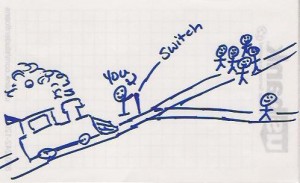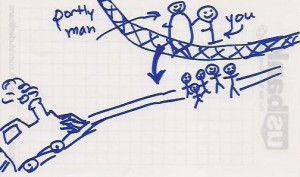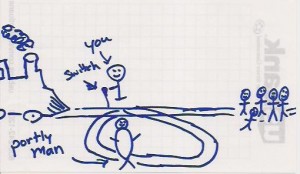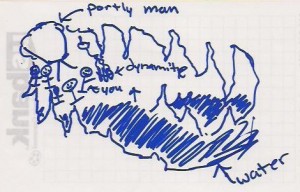
This page is intended to present the challenges posed to traditional philosophical conceptions of ethics posed by certain findings of situationist psychology, but I intend it to present these ideas in an extremely simplified and diluted form in order to facilitate rapid digestion and discussion.
The basic notion, the general layout, and most of the examples provided are shamelessly hijacked from the cogent yet accessible book [amazonify]0674026098::text::::Experiments in Ethics[/amazonify] by Princeton professor of philosophy Kwame Anthony Appiah. I highly recommend actually purchasing this text and reading through the whole of it yourself, but failing that you might also find his 2007 APA presidential address helpful, as it reproduces much of the content of his larger work. I have focused on the content of the second and third chapters of Appiah’s book, and I have adapted and reinterpreted much of this material to hone discussion and ease a lot of important ideas onto a small span of time. I have not been entirely faithful to the author’s views and conclusions.
Virtue Ethics
The ethical discussion here is going to focus on “virtue ethics”–the offshoot of ethical theory inspired and represented by Aristotle and his Nicomachean Ethics. To grossly oversimplify this complex and multifarious perspective, virtue ethics focuses on a lifelong process of acquiring increasingly stable dispositions to commit right actions and live a good life. Some terminological precision might be helpful to avoid confusion. For most virtue ethicists, including Aristotle, the term ethics describes the path to The Good Life™, or eudaimonia (anc. greek ??????????: flourishing); the word morality, on the other hand, is our responsibilities toward others. We often muddle this meaningful terminiological distinction. Virtue is excellence (aristotle’s word ?????, if I recall correctly, indicated something along the lines of anything achieving its practical or natural purpose).
Virtue ethics is of course just one of a number of ethical perspectives to choose from, but is particularly relevant to the juxtaposition of socio-psychological research for a number of reasons. First, virtue ethics is not simply a normative standard for ethical behavior–it doesn’t just tell us how we should live. Rather, it is also a sort of psychological theory unto itself–telling us that we, as humans, are able to form stable dispositions of behavior based on habituation, socialization, natural abilities, and other circumstances. It also posits that we have the ability, and indeed it is in our interest, to intentionally seek the modification and perfection of these tendencies. Furthermore, we tend to place stock in virtue ethics as an ideal. Social psychologists refer to our tendency towards the fundamental attribution error in which we, upon witnessing someone perform some sort of action, tend to interpret these actions as indications of enduring character traits. When a stranger offers to share an umbrella, you say that she offers because she is a good person. When a man robs a bank, you infer that he is bad. When a child throws a tantrum, you decide she is spoiled; when a driver cuts you off, you know she is a rude woman. Psychological researchers have even found that we go so far as to ascribe characteristics to people based on their actions, even when we are told that their actions were decided by someone else or by a lottery.
Virtue ethicists, like Aristotle, tend to conclude that to truly live the good life, we must live as the virtuous person would live. Traits and actions are not simple, isolated ethical components. An act by itself is not simply virtuous, “a virtuous act is one that a virtuous person would do, done for the reasons a virtuous person would do it”. Likewise, most virtue ethicists conclude that a virtuous person exhibits “consistent dispositions of response under different contexts” and that the array of virtuous traits–perhaps magnanimity, courage, honor, patience, truthfulness, compassion–cannot be held completely in isolation. In other words, to act with magnanimity and compassion, one needs to have courage and honor; acting with real courage requires compassion, and so on. There is a web of interdependence, a breadth of complexity, and a independence of context associated with virtue ethics.
The Challenges of Situationist Psychology
In the 20th century, psychological research on ethical responses began questioning the stability and context independence of the character dispositions assumed by virtue ethicists. Situationist research challenged that our dispositions are simply not stable accross different cirumstances. We may be predictably polite and considerate in some circumstances and just as reliably rude and offending in others. Some examples to consider:
In the late 1920s, the Yale psychologists Hugh Hartshorne and Mark May studied some ten thousand American schoolchildren, giving them opportunities to lie, cheat, and steal in various academic and athletic situations. What they found is that deceit was, to a surprising extent, a functioin of situations. It didn’t track at all with measurable personality traits or assessments of moral reasoning, and the data gave little support to cross-situational predictions; the child who wouldn’t break the rules at home, even when it seemed nobody was looking, was no less likely to cheat on an exam at school. Knowing that a child cheated on a spelling test didn’t even tell you whether he would cheat on a math test, let alone in a sporting event. (Appiah, Experiments in Ethics, p. 40)
These studies seem to clearly infer that people–or at least children–do not display the stable, cross-situational characteristics which a virtue theorist would expect from a virtuous person. Situationist psychologists (as opposed to globalists) argue that this is how we, as human beings, operate. What we do is not driven so much by who we are as it is by circumstances of our situations which we would not have even considered important. Perhaps this example is unfair, though. Aristotle certainly wouldn’t have considered it possible for children to be virtuous in the same way that adults may be. Most modern virtue ethicists would agree, too; after all, if a virtuous disposition must be acquired over the course of one’s life through habituation, socialization, and environment, children certainly have not been afforded the time to become adequately virtuous. Still, if nothing else these studies imply that either our natural tendencies or our earliest bouts with socialization lean us toward less-than-coherent dispositions. Perhaps, as we age, we tend to accrue stability of character and develop ourselves as virtuous beings.
A slew of related studies hint at how this hope pans out. One salient study done in 1972 finds strongly in favor of situationist psychology. Here, a pair of researchers found that a person who dropped their papers outside a telephone booth would only be assisted by a stranger only 4% of the time; however, if that stranger in the phone booth happened upon a gratuitous dime in the coin return slot, she would help pick up the papers more than 85% of the time. The statistical significance of this result is so astounding as to make it seem much more likely that a person’s behavior is explained by his mood rather than whether or not he has a consistently helpful disposition. Similar studies have shown that, for instance, you are more likely to get change from a stranger in front of a better smelling shop, you are more likely to get help from somebody when ambient noise levels are more comfortable, and you are less likely to be helped by Seminarians if they have been told they are late for a meeting (even after reflecting on the story of the good Samaritan).
There are other studies that reflect the notion that our moral choices may primarily be functions of situational elements even more minor than how cheerful we feel. Consider the following example (taken, again from Appiah’s book):
We divide [a group of] subjects into two groups. The task, we tell them, is to choose between two policy options as we prepare for an impending outbreak of the Asian Flu. If we do nothing, 600 people can be expected to die.
One group is given options (A) and (B), and the other is asked to choose from (C) and (D), all options shown below (Try making the moral decision yourself. It’s fun).
Group one’s options:
A) a policy that saves 200 people
B) a policy with a one-thirds chance of saving everybody, and a two-thirds chance of saving nobody
Meanwhile, group two has these choices:
C) a policy in which 400 people die
D) a policy with a one-third chance that nobody dies, and a two-thirds chance that 600 will die
Having had the luxury of viewing both groups’ options, you may have noticed both that options (A) and (C) are the same and that options (B) and (D) are the same (in fact, from a probability standpoint, all four options yield the same gain/loss likelihood). Yet, the group who views only options (A) and (B) can be reliably expected to choose option (A), while the second group will predictably decide on policy (D). The factor that seems to change the moral judgments in these cases, then, is simply the framing of the question.
How we think about ethical choices
So, if we tend to make our moral and ethical decisions based on factors that are completely irrelevant–if we have just found a dime, if we experience pleasant smells and sounds, if our choices are framed a certain way–is there any hope for us to be ethical in the manner virtue ethicists describe?
Part of the problem for us in making ethical decisions–and, indeed, one of the reasons that virtue ethicists consistently emphasize habituation–is that when we make our decisions we are forced to make them with limited time and with limited devotion of our cognitive resources. Ethical theorists have developed the notion of the moral heuristic in order to describe a way in which humans can make complex ethical decisions given our limited resources. These heuristics are generalized, simplified rules for handling ethical situations–a sort of quasi-deontological way of responding to our circumstances. For example, we can calculate beforehand in the abstract that human life has some general value, and that a greater number of human lives therefore has a greater value in general. Therefore, when an axe-murderer knocks at your door, demanding that you advise her on whether to kill either one random stranger or three random strangers, the moral choice is a no-brainer. In a pinch, the heuristic can help us make decisions about otherwise much more difficult ethical problems. However, sometimes these heuristics can fail us. If the killer demands that you choose between the killing of either a ground-breaking oncologist or three other axe-murderers, perhaps you might want to reconsider the general rules you’ve come to develop. In many ways, the experience and habituation that virtue ethicists emphasize provide us with choice-making tools similar to this concept of moral heuristics, because we habituate ourselves to respond to certain circumstances in certain, hopefully virtuous, patterns.
Let’s have some (ethical) fun
Let’s work a bit on employing some ethical considerations, taking into account a little bit of this situationist psychology. Here are a few classic examples of the sort of “emergency” ethical situations that philosophers love to throw back and forth at each other:
Trolley Scenario #1
Five people are standing on a train track, towards which a train is heading. If you do nothing, the train will kill all five people. However, you have the ability to save these five people by diverting the train onto a separate track, but this will inevitably kill one person who stands on that piece of rail. Should you divert the train?

According to Appiah, most philosophers, and around 80-90% of people in general choose to divert the train.
Now, let’s try another scenario. In this instance, you are standing on a bridge above the trolley car heading towards the five people. You are not able to divert the train, but there is a 300 pound man with you on the bridge. If you push the man of the bridge, you know his body weight will be enough to stop the car in time to save the lives of the five people on the rail line ahead. Should you push him?

Although in this case it seems as if you are provided with the same options as in scenario #1–do nothing and five people die, or act and one person dies–in this case most people tend to agree that it is not acceptable to push the fat man off the bridge to save the others. What is the basis for this change of thought?
Let’s try another, somewhat middle-ground scenario. In this new conundrum, you have a choice between letting a train travel along its course to kill the five people up ahead, or diverting the train onto a loop. This time, the 300 pound man is standing on the track on this separate loop, and his body weight will again be enough to stop the train and save the lives of the five people ahead, with the sacrifice of his own. Should you throw the switch?

One more example might help get at yet one final shade of distinction. On a spelunking expedition, you and a number of others are in a cave rapidly filling with water. On your way out, that 300 pound man from the last two examples becomes lodged in your exit path. If you do not dislodge him, everyone but he will die. A small quantity of dynamite which you have on hand will blow the man up, but allow you and your four other companions to escape and survive. Should you light the fuse?

Endless variations on these “moral emergency” examples may be thought up to get into every nook and cranny of meaningful ethical distinctions, but statistical surveys of people analyzing these various moral problems generally finds one thing: what we say is the ethical option across these situations is hard to pin down to a stable set of principles stemming from some unified disposition. How can we account for, as an example, preferring to save the life of only one person in one example and five in another example? How much does the framing matter? With limited resources and limited time, will any level of rationalization lead us to a conclusion on what the virtuous response to such situations might be?
Mildly off-topic considerations
{to be posted after discussion has occurred.}
If you want to do some good ol’ fashioned forum-style discussion about this page, follow this link.
Thanks.
I’m having a bit of a hard time understanding the fat-man-on-the-loop scenario. How does it differ from the first scenario? Just presentation, or does the loop give him time to make his own choice? If it’s his own choice, then I suppose it would excuse you from actually having to make a choice to pull the switch. Pulling the switch would pass on the problem. But if he wouldn’t have a choice, if it wouldn’t give him enough time, I don’t see how the presentation significantly differs from that of the first scenario.
But I love the way you’re playing around with this Jackson! I’ve got an excerpt of an article one of the profs here is working on that you might enjoy..
Matt,
This was a discussion that came up during discussion about this topic, and I’ll give the same answer that I gave then. I think Example #3 is an attempt at drawing a finer line between example #1 and example #2 (a later attempt to further refine Phillipa Foot’s original examples). The important, but subtle, difference here is that in example #1, the death of the portly man is not the *means* by which the people are saved. In the first situation, the man is not killed as a necessary step in the process of saving the other five; rather, his death is an unintended, albeit foreseen, consequence of the action of saving the lives of the five other people. In other words, you are acting to save the lives of these five people, and the fat man just happened to be the unfortunate victim of your otherwise laudable method of saving their lives.
In the second example, however, a number of important factors change. First, and most relevant, the death of the large man is the direct means by which you save the lives of the five individuals. His death is not an unintended consequence of a laudable means, it is a despicable means through which you seek the better of two regrettable consequences. However, this scenario also changes how personal we get with the subject, and it “dirties” the hands of you as the moral agent a little bit more.
Thus, example #3 seeks to preserve the choice between using the regrettable and perhaps morally disgusting use of the death of one as the means by which others are saved, without getting up-close-and-personal with the fat man.
Does this fine-line distinction end up mattering at all? Perhaps surprisingly, the answer is yes. Different proportions of people answer each of these different scenarios differently. Not only that, but functional MRI brain scans of persons indicate that different parts of the brain are active depending on which of these situations they examine. In “personal” moral situations, like the bridge scenario for example, people tend to have more active emotional responses, and they are much less likely to kill the portly man.
Thanks, by the way, for taking a peek at the article. It’s unfortunate that you couldn’t have been present for discussion. I’d love to hear more about the article you’ve gotten your hands on, or anything else you’ve been studying or doing.
Ahh, so more people will likely choose 3 than 2, though they’re the same thing, because the fat man’s at a distance, removing the immediate emotional element that was present and inhibitive in option 2.
I’ll get back to you soon about India. Right now, I’m preparing to catch a train and I’ve got to run.
And I’d like to hear from you too about everything, your process on choosing a future, the philosophy club, work, Will, etc. Do you think people from the Augie phil club could be convinced to join “subjectively true?”